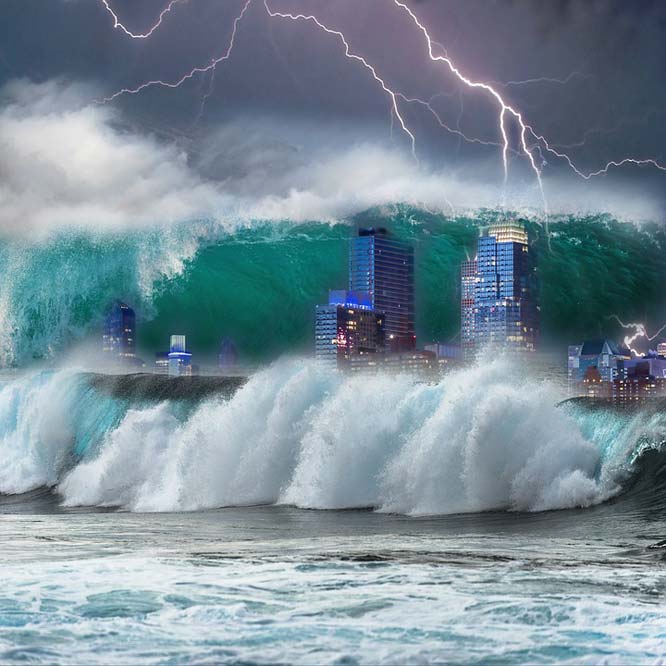
In 15th-century Peru, we learnt, children were sacrificed to propitiate the Chimu gods in an attempt to end natural disasters caused by the climatic phenomenon we now call, appropriately enough, El Niño.
In our time the roles have been reversed. Now children warning of an impending climate catastrophe are the ones that have to be propitiated. Now it is they who demand sacrifices.
The arrival of Greta Thunberg in New York was one of many recent events that illustrate how rapidly modern environmentalism is degenerating into a millenarian cult.
Greta, 16, is in New York at the invitation of the United Nations, having already established herself as a public figure in Europe by leading mass truancies to protest against climate change (“Fridays for Future”). Rather than flying, she sailed across the Atlantic in an “emissions-free yacht” to spare the Earth’s atmosphere the exhaust from a plane that was flying to New York anyway, with or without her.
“Just before 3pm,” reported The New York Times, “a shout went up from those waiting in the intermittent light rain to greet her . . . most of them young activists. The boat’s black sails had come into sight just blocks from Wall Street, the heart of the global financial system whose investments in fossil fuels are one of the main targets of climate protesters.”
Amid the drizzle, the bankers cowered before the wrath of Greta. From the headquarters of the once-mighty Goldman Sachs came the feeble tweet: “We’re committed to helping win the race and proud to welcome @GretaThunberg to New York.” They’ll be sacrificing the oil company accounts on Tuesday.
“Sea levels are rising and so are we!” the young activists chanted, according to the priceless Times report. Once safely ashore in Manhattan, Greta lost no time in urging Donald Trump “just to listen to the science, [as] he obviously doesn’t do that”.
Science. Or perhaps science fiction. There is at first something unnervingly reminiscent of John Wyndham’s Midwich Cuckoos about Greta. The pigtails. The unsmiling stare. But then you learn that she has struggled with mental health conditions, including high-functioning autism and obsessive-compulsive disorder. This makes it hard to criticise her.
Yet what does it tell us about our world that Greta is about to add the UN general assembly to the list of august bodies she has addressed in the past year, after the Pope, the World Economic Forum and the European parliament? “I want you to panic,” she said at Davos in January. “I want you to feel the fear I feel every day.” That is not the voice of science. It is the voice of a millenarian cult leader.
The end of the world is not nigh, however.
Now, I am not about to deny that climate change is happening or that global warming is going to have adverse effects in the foreseeable future. Not even Bjorn Lomborg, the sceptical Danish economist, says that. The point, as he argued in a recent, brilliant presentation at the Hoover Institution, is that — as in the past — we humans are capable of adapting to climate change in ways that can significantly mitigate its adverse effects.
It would be foolish to do nothing to prepare for a warmer planet. But it would be more foolish to pretend that we are doing something that will significantly reduce carbon dioxide emissions when we are not.
Greta’s carbon-neutral Atlantic crossing is a case in point. As yachts require crews, it is almost certain that more people will end up flying across the Atlantic as a result of her stunt than if she had caught a scheduled flight. The Paris climate accord is a scaled-up version of this. Even if adhered to, it will scarcely increase the share of global energy that comes from renewable sources. The effect on average temperature will be negligible: just 1% of what would be needed to limit the rise in global temperature by 2100 to 1.5C.
It would be even more foolish to take, on the basis of apocalyptic visions, extreme precautions that end up costing more than inaction would. Subsidies to renewable energy have a cost. Cutting CO2 emissions has a cost. Those costs in terms of forgone growth could exceed the costs of climate damage if we overreach in the way that, for example, Alexandria Ocasio-Cortez’s Green New Deal would. The key point, as Lomborg says, is that vastly more people die as a consequence of poverty each year than die as a consequence of global warming. A CO2 emissions target is not the optimal target if meeting it would trap millions in poverty, not to mention ignorance and ill-health.
Back in the 1400s people in Peru believed that sacrificing their children would reduce rainfall. Not only did that not work. Regardless of their grim, murderous rites, they were soon to be hit by a far worse natural disaster than rain, namely the various lethal pandemics that swept the Americas after the arrival of Europeans. We know climate change can happen, because it followed hard on the heels of this “great dying”: the collapsing population in the New World reduced carbon dioxide levels as large areas of land returned to the wild, leading to the so-called Little Ice Age.
I have said more than once in recent years that our era has more in common with the 16th and 17th centuries than with any intervening period — and not just because of the splendidly Stuart-style constitutional crisis currently gripping the British Isles. It is the early-modern world all over again, not least because the effects of the internet on popular belief so closely resemble the effects of the printing press.
The challenge of millenarianism — as Alan Bennett, Peter Cook, Jonathan Miller and Dudley Moore pointed out in my favourite sketch from Beyond the Fringe — is what to do when the end of the world fails to happen.
Greta is right about one thing. The chances are virtually nil that the governments of the world will do as she asks. While the West virtue-signals, China, India, Brazil and others will continue to attach more importance to growth than to curbing emissions. The planet will grow warmer, just as it grew colder in the 1600s. And we shall adapt, taking advantage of the technological innovations that will gradually improve how we generate and store electrical power and ward off flood waters.
It is 2059. To the embarrassment (but, I hope, relief) of Greta Thunberg, now 56, her great expectations of the end of the world have not been fulfilled. Jair Bolsonaro didn’t torch the Amazon. Trump didn’t incinerate the planet. You should come back to New York to celebrate our survival, Greta.
But, this time, fly.
(COMMENT, BELOW)
Niall Ferguson's latest book is "The Square and the Tower: Networks and Power from the Freemasons to Facebook." (Buy it at a 50% discount by clicking here or order in KINDLE edition at a 74% discount by clicking here). He is the Milbank Family Senior Fellow at the Hoover Institution, Stanford University, and a senior fellow of the Center for European Studies, Harvard, where he served for twelve years as the Laurence A. Tisch Professor of History.


 Contact The Editor
Contact The Editor
 Articles By This Author
Articles By This Author